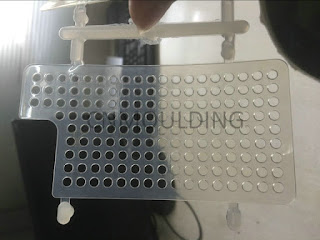Design points for injection molding parts
In the injection molding process, due to
the uneven cooling and uneven shrinkage of the plastic in the cavity and the
unreasonable structural design of the injection molded part, it is easy to
cause various defects of the product:
Shrinkage, weld marks, pores, deformation,
napping, top injury, flash.
In order to obtain high-quality injection
molding products, we must fully consider the structural processability when
designing the products. The following is a combination of the main structural
characteristics of the injection molding products to analyze the methods to
avoid injection defects. Design points for injection molding parts
1 mold opening direction and parting line
Each injection molding product must first
determine its mold opening direction and parting line at the beginning of the
design to ensure that the core pulling mechanism is minimized and the influence
of the parting line on the appearance is eliminated.
1.1 After the mold opening direction
is determined, the reinforcement ribs, snaps, protrusions, and other structures
of the product are designed to be consistent with the mold opening direction as
much as possible to avoid the core pulling to reduce the seam line and prolong
the life of the mold.
1.2, For example, the direction of the mold
opening of the bumper is generally the direction of the body coordinate,. If
the mold opening direction is designed to be inconsistent with the χ axis, the
angle must be indicated in the product drawing.
1.3 After the mold opening direction is
determined, the appropriate parting line can be selected to improve the
appearance and performance.
2 draft angle
2.1 Appropriate draft angle can avoid
product pulling. The smooth surface should have a draft angle greater than 0.5
degrees, a fine grain surface greater than 1 degree, and a rough grain surface
greater than 1.5 degrees.
2.2 Appropriate draft angle can avoid
product top injury.
2.3 Deep cavity structure product design
When the outer surface slope is required to be smaller than the inner surface
slope, to ensure that the mold core is not biased during injection, to obtain a
uniform product wall thickness, and to ensure the material density strength of
the product opening.
3 product wall thickness
3.1 All kinds of plastics have
a certain wall thickness range, generally 0.5 ~ 4mm, when the wall thickness
exceeds 4mm, it will cause the cooling time is too long, resulting in shrinkage
and other issues should consider changing the product structure.
3.2 Uneven wall thickness will cause
surface shrinkage.
3.3 Uneven wall thickness can cause pores
and weld lines.
4 stiffeners
4.1 Reasonable application of ribs can
increase product rigidity and reduce deformation.
4.2 The thickness of the ribs must
be less than 1/3 of the wall thickness of the product, otherwise the surface
will be reduced.


没有评论:
发表评论